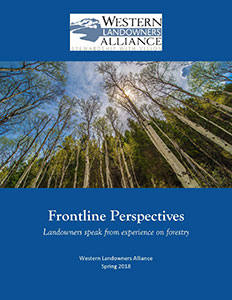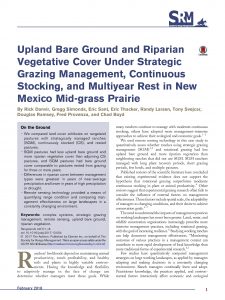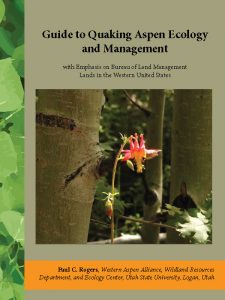In the West, our livelihoods, communities and wildlife are all dependent on the health, productivity and utilization of forests and rangelands. From grazing management to the application of prescribed fire, many landowners have a wealth of knowledge and experience in the stewardship of these working lands. Western Landowners provides opportunities to share this information and learn from one another. In addition, we make science, resources, funding opportunities and innovative advances in technology and practice available to landowners through forums, field visits, newsletters and on our website.
Fontline Perspectives: Landowners Speak from Experience on Forestry
The American West is home to some of our nation's most iconic forests. WLA staff interviewed landowners throughout the West to gain their perspective on these incredibly diverse ecosystems and their role in supporting local economies and providing critical water supplies, recreational opportunities and sanctuary for wildlife populations.
NEW MEXICO GRAZING STUDY Shows Adaptive Management is GREAT for your Bottom Line!
Ranchers' livelihoods depend on maintaining animal productivity, ranch profitability and healthy soils and plants in highly variable environments. Having the knowledge and flexibility to adaptively manage in the face of change can determine whether managers meet these goals. This grazing management case-study by WLA's Rick Danvir is a must-read for all managers.
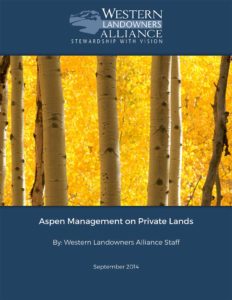
Aspen Management on Private Lands
The decline of aspen in Western forests over the past several decades has been a significant concern to scientists, foresters and land managers, including private landowners. This article describes important aspen management and research on private lands and provides additional resources for landowners on aspen restoration.
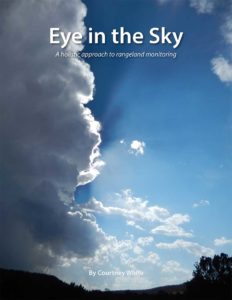
Eye in the Sky: A Holistic Approach to Rangeland Monitoring
An explanation of WLA’s multi-year rangeland monitoring study, which used field data and remote sensing to assess the effects of varying management strategies on rangeland health and productivity in New Mexico.
Guide to Quaking Aspen Ecology and Management
A 2017 Western Aspen Alliance publication exploring a "systems approach" to aspen ecology and management.
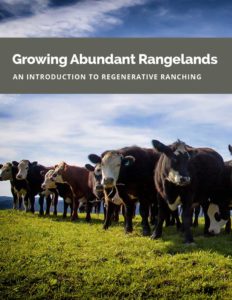
Growing Abundant Rangelands
With recommendations for planning, practicing and monitoring grazing management, this guide is designed to help practitioners significantly improve soil health, water retention and pasture productivity.
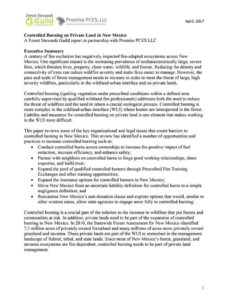
Controlled Burning on Private Land in New Mexico
This paper reviews some of the key organizational and legal issues that create barriers to controlled burning in New Mexico and has identified a number of opportunities and practices to increase controlled burning.
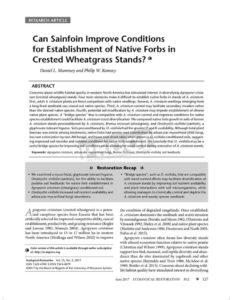
Can Sainfoin Improve Conditions for Establishment of Native Forbs in Crested Wheatgrass Stands?
This paper from MPG Ranch discusses the use of a plant called sainfoin. Sainfoin is a nitrogen fixing legume that can aid efforts to restore native prairies by increasing the amount of nutrients available to plants and the numbers of beneficial soil microbes.
PastureMap
PastureMap is comprehensive ranch management software that helps you keep records, maps, and field photos on your phone. PastureMap is accessible in the field so everyone is on the same page.
Preestablished Plant Influences on Antelope Bitterbrush Seedling Recruitment and Growth: Analysis of Species and Positional Effects
Bitterbrush provides great browse for mule deer, cattle and elk, making it one of the most desirable rangeland shrubs. Is sticks up above the snow in winter and re-sprouts after fire. However, getting bitterbrush established from seed can be difficult. Seedlings don’t tolerate competition, and planting it alone often leads to weed problems. Researchers at MPG Ranch tested several common range plants for compatibility with bitterbrush seedlings. They found that bitterbrush does as well when seeded near established bottlebrush squirreltail as it does when planted alone. The research also shows that inoculations with mycorrhizal fungi or nitrogen-fixing symbionts are not needed to achieve strong bitterbrush establishment.
Holistic Management of Riparian Areas from HMI
Long-time Holistic Management practitioner Agee Smith offers a presentation of the work he has done to improve the riparian corridors through holistic planned grazing.
Forest Wisdom
A national publication by the Forest Stewards Guild, covers emerging issues in forestry, policy developments, and Guild members' work across the United States
Principles and Practices for the Restoration of Ponderosa Pine and Dry Mixed-Conifer Forests of the Colorado Front Range
A new report lays out guidelines for restoring the Colorado Front Range Forests to a healthier condition, closer to their historic appearance.
The report takes into consideration the unique characteristics and climate of the Front Range. Thinning the forests and building back heterogeneity into the landscape—a mix of different ages, sizes and spacing of trees—will help them withstand not just wildfire, drought and insects but climate change.
Reducing Barriers to Use of Prescribed Fire in Privately Owned Forests
A publication by Colorado State Forest Service and CSU's Colorado Forest Restoration Institute, describes the primary challenges faced by private landowners who want to manage their forests with fire and specific recommendations on how to overcome those barriers.
Join WLA to stay up to date on the most important news and policy for land stewards.
Become a member for free today and we will send you the news and policy developments critical to the economic and ecological health of working lands.
WLA works on behalf of landowners and practitioners throughout the West. We will never share your contact information with anyone.
